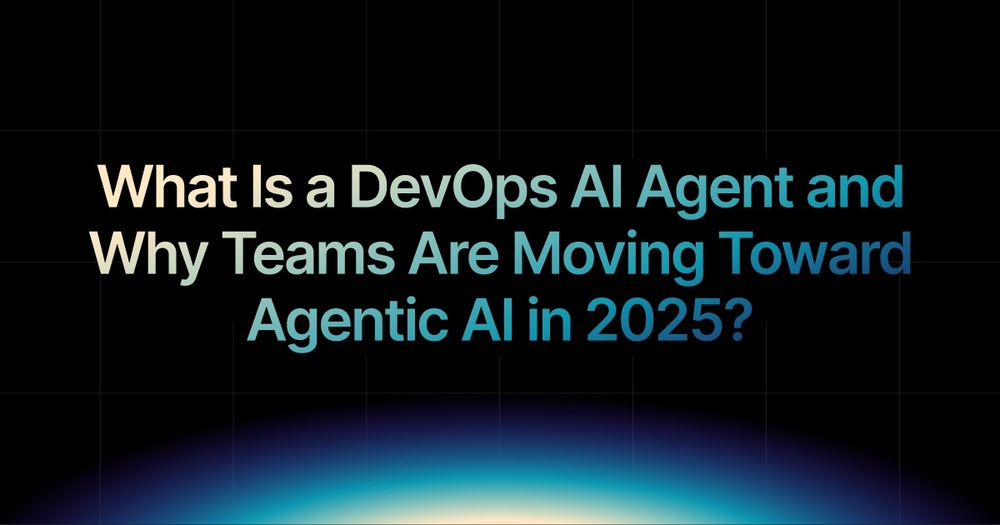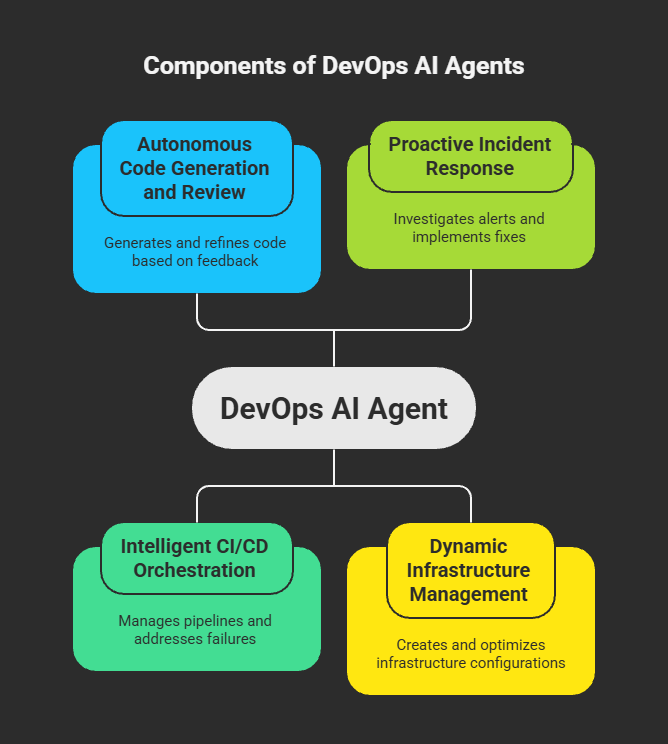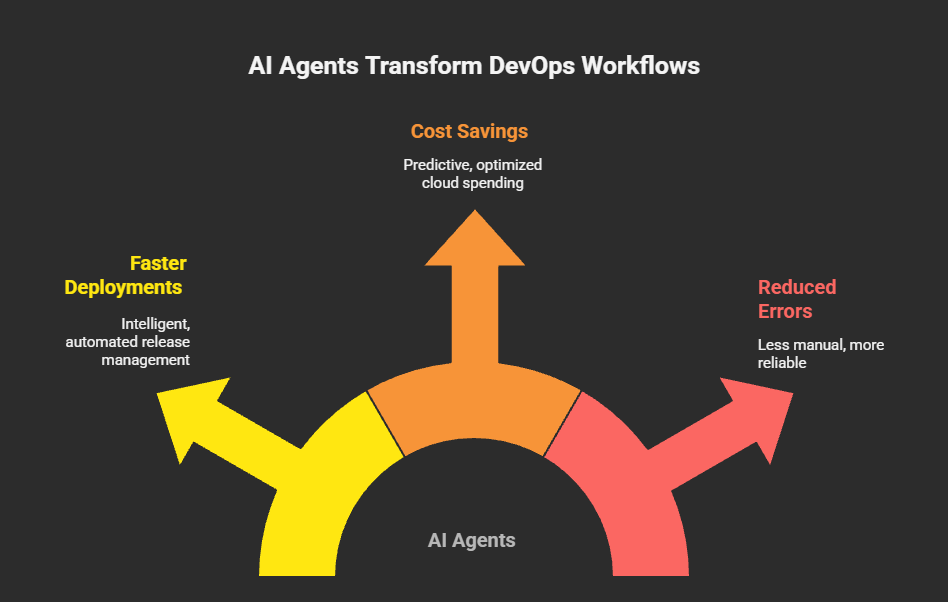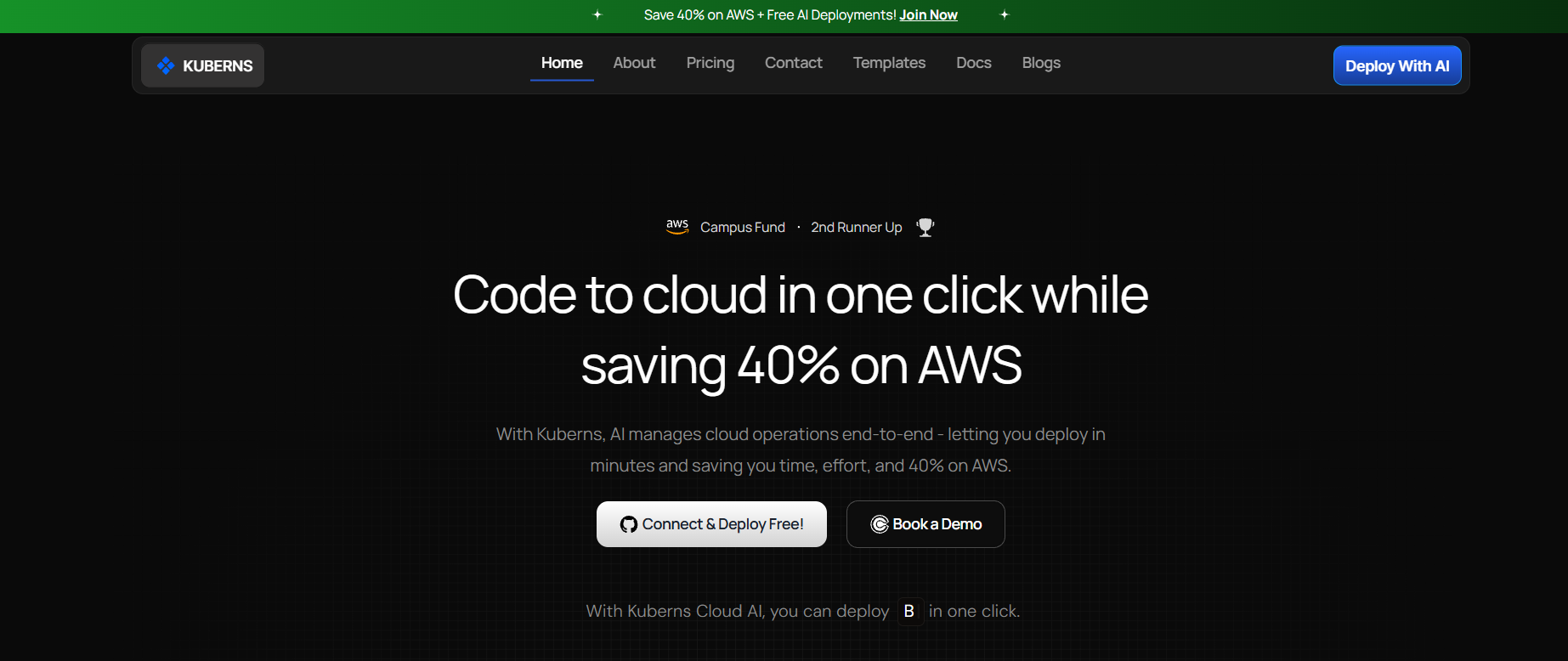Published
- 15 min read
What Is a DevOps AI Agent and Why Teams Are Moving Toward Agentic AI?

Key Highlights
- A DevOps AI agent is an autonomous system that enhances DevOps workflows by making decisions, not just following scripts.
- The impact of AI is shifting teams from traditional automation tools toward intelligent, agentic AI for greater efficiency.
- AI agents improve scalability and proactively manage incidents by predicting issues before they occur.
- Key benefits include faster deployments, significant cloud cost savings, and a reduction in manual errors.
- The adoption of agentic AI boosts developer productivity by automating repetitive tasks and fostering innovation.
- Platforms like Kuberns simplify the integration of AI agents into your existing development and operations pipelines.
Introduction
A DevOps AI Agent is quickly becoming one of the most talked-about innovations in modern software delivery. Instead of relying only on automation scripts or manual pipelines, teams are now turning to AI agents that can actively make decisions, adapt to changes, and optimize workflows in real time. This marks the rise of agentic AI in DevOps, where intelligent systems move beyond task execution to act like autonomous teammates.
The impact of AI is clear: it promises to streamline operations, reduce overhead, and accelerate innovation.
Are you prepared for how these intelligent agents will reshape your development lifecycle and unlock new levels of productivity?
What Is a DevOps AI Agent?
 A DevOps AI Agent is more than just another automation tool. It is an intelligent, autonomous entity designed to operate within your software development and IT operations. Unlike traditional tools that execute predefined commands, an AI agent uses artificial intelligence to perceive its environment, make independent decisions, and perform complex tasks to achieve specific goals.
A DevOps AI Agent is more than just another automation tool. It is an intelligent, autonomous entity designed to operate within your software development and IT operations. Unlike traditional tools that execute predefined commands, an AI agent uses artificial intelligence to perceive its environment, make independent decisions, and perform complex tasks to achieve specific goals.
These agents integrate directly into DevOps workflows, handling everything from code generation to incident response with minimal human oversight.
By learning from data and feedback, they continuously optimise processes, making your entire software delivery pipeline smarter and more resilient.
For freelancers, this means fewer late nights managing servers. For startups, it brings predictable operations without hiring a large DevOps team. And for established teams, it reduces the pressure of manual checks and enables faster, more reliable releases.
From Automation Tools to AI Agents in DevOps
The evolution from traditional DevOps automation tools to AI agents marks a fundamental shift in how we approach operational efficiency. Traditional automation relies on scripts and rule-based systems.
You define a specific workflow: if X happens, do Y, and the tool executes it perfectly every time. However, these tools cannot handle unexpected scenarios or make decisions outside their programming.
AI agents in DevOps, on the other hand, operate with a degree of autonomy. They are not just following a script; they are pursuing a goal. For instance, instead of just running a deployment script, an AI agent can analyse system performance, decide the best time to deploy, and even roll back automatically if it detects an anomaly, all without a predefined rule for that specific situation.
This leap from reactive execution to proactive decision-making is what sets an AI agent apart. While automation tools are excellent at doing what they are told, AI agents excel at figuring out what needs to be done. This transforms DevOps workflows from rigid processes into dynamic, self-optimising systems.
Key Capabilities of DevOps AI Agents
So, what does an AI DevOps agent actually do? At its core, it works by combining large language models (LLMs) for reasoning with integrations to your existing tools and systems. This allows the AI to understand requests, create plans, execute tasks, and observe the results. It’s a continuous loop of thinking and doing.
The capabilities of these agents span the entire software lifecycle, moving far beyond what traditional automation tools can offer. They act as intelligent partners to your team, taking on complex responsibilities that require context and judgment. This empowers your team to focus on strategic work instead of manual oversight.
Key capabilities include:
- Autonomous Code Generation and Review: Generating code from requirements, running tests, and refining it based on real-time feedback.
- Intelligent CI/CD Orchestration: Managing the entire pipeline, identifying bottlenecks, and automatically addressing build or deployment failures.
- Proactive Incident Response: Investigating alerts, correlating data to find the root cause, and implementing fixes autonomously.
- Dynamic Infrastructure Management: Creating and maintaining Infrastructure as Code (IaC), optimising configurations for cost, performance, and security.
Why Teams Are Moving Toward Agentic AI in DevOps?
 The move toward agentic AI in DevOps is driven by a simple need: to build and maintain complex software systems faster and more reliably than ever before. Traditional methods are hitting a ceiling, and the sheer volume of data and operational tasks has become too much for human teams to manage manually. The impact of AI is providing a necessary solution.
The move toward agentic AI in DevOps is driven by a simple need: to build and maintain complex software systems faster and more reliably than ever before. Traditional methods are hitting a ceiling, and the sheer volume of data and operational tasks has become too much for human teams to manage manually. The impact of AI is providing a necessary solution.
By introducing an AI agent into DevOps workflows, teams can offload cognitive labour, not just repetitive tasks. This AI-driven approach enables a proactive stance on everything from deployments to cost management, making operations smarter and more predictive.
Below, we explore the specific reasons why this shift is accelerating.
Faster and Smarter Deployments
One of the most immediate benefits of AI agents in DevOps is the dramatic improvement in deployment speed and intelligence. These agents automate complex decision-making processes during rollouts, reducing both risk and lead time. Instead of relying on manual checks and rigid pipeline gates, you can trust an AI agent to manage the process based on real-time data.
The impact of this AI on your DevOps workflows is profound. For example, an agent can perform intelligent canary analysis by monitoring a wide array of system metrics, not just basic health checks, to determine if a new release is safe to promote. This data-driven approach catches subtle issues that manual reviews might miss.
This leads to a more resilient and efficient delivery cycle where agents:
- Predict deployment risks by analysing code changes and historical performance data.
- Orchestrate adaptive rollouts, adjusting the deployment speed based on live system feedback.
- Automate rollbacks the moment a performance degradation or anomaly is detected, minimising user impact.
Cloud Cost Savings and Predictive Scaling
Beyond speed, agentic AI delivers significant financial advantages through intelligent cloud cost optimisation.
In complex cloud environments, over-provisioning is a common and costly problem. An AI agent tackles this by continuously analysing usage patterns and predicting future demand with remarkable accuracy.
Multi-agent AI systems modernise software delivery by creating a network of specialised agents that collaborate. For instance, one agent might monitor application performance while another tracks cloud spending. Together, they can make holistic decisions, such as scaling down resources during off-peak hours or choosing a more cost-effective instance type based on workload patterns. This collaborative intelligence ensures you only pay for what you need.
This proactive approach to resource management helps you achieve:
- Predictive scaling that aligns resources with actual demand, preventing waste.
- Automated rightsizing of instances and storage based on historical data.
- Continuous cost analysis that identifies and flags spending anomalies in your DevOps workflows.
Reduced Manual Workflows and Human Error
Manual steps in deployments are slow, repetitive, and error-prone. By adopting AI agents for DevOps, businesses remove unnecessary human intervention, reducing mistakes while freeing people to focus on more valuable tasks.
- Freelancers can concentrate on building features for clients instead of troubleshooting infrastructure.
- Startups reduce dependency on dedicated DevOps engineers for every small task.
- Teams cut down incidents caused by manual errors and ensure smoother releases.
This shift is all about trust in intelligent systems to handle the routine. If your goal is to reduce manual tasks across your workflow, check out How to Use AI in DevOps and Developer Workflow to Automate Deployments
Advantages of Adopting Agentic AI in DevOps for 2025
The advantages of adopting agentic AI in DevOps extend beyond simple efficiency gains, fundamentally changing how organisations build, deploy, and manage software. The true impact of AI lies in creating systems that are not just automated but also adaptive and self-healing.
An AI agent embedded in your DevOps workflows provides the intelligence needed to manage increasingly complex environments. This allows you to scale confidently, control costs effectively, and empower your developers to innovate faster. The following sections break down these key advantages.
Scalability and Proactive Incident Management
As your systems grow, managing them effectively becomes exponentially harder. Agentic AI is crucial for achieving true scalability. An AI agent can monitor thousands of metrics simultaneously, detecting subtle patterns that signal an impending issue. This allows for proactive incident management, where problems are fixed before they ever impact a user.
One agent will handle security scanning, performance monitoring, and CI/CD orchestration. They collaborate to maintain system health, modernising software delivery by creating a resilient, self-managing ecosystem. This approach transforms incident management from a reactive fire drill into a proactive, automated process.
Here’s how AI-driven incident management compares to traditional methods:
| Feature | Traditional Management | AI-Driven Management |
|---|---|---|
| Detection | Reactive, based on predefined alert thresholds. | Proactive, based on anomaly detection and predictive analytics. |
| Analysis | Manual effort to correlate logs and metrics across tools. | Automated root cause analysis connecting disparate signals. |
| Resolution | Requires human intervention to diagnose and implement a fix. | Suggests or autonomously implements remediation actions. |
Smarter Resource Allocation and Cost Control
Effective resource allocation and cost control are constant challenges in dynamic cloud environments. An AI agent automates these critical tasks by applying intelligence to your resource consumption. Instead of relying on static configurations or manual adjustments, the agent optimises your infrastructure in real-time based on actual workload demands.
This brings cost control into the earliest stages of development, preventing budget surprises down the line.
With an AI agent, you can achieve:
- Automated infrastructure optimisation by dynamically adjusting resources for performance and cost.
- Intelligent capacity planning that uses predictive models to forecast future needs.
- Granular cost visibility by attributing spending to specific features or teams within your DevOps workflows.
Developer Productivity and Innovation
Ultimately, the goal of any DevOps tool is to enhance developer productivity and foster innovation. An AI agent achieves this by acting as a “copilot” for your entire team.
As Thomas Dohmke, CEO of GitHub, notes, AI can augment developers’ capabilities, “allowing them to focus on more creative and strategic tasks.”
Developers can absolutely use AI agents for DevOps tasks. For instance, a developer can use an agent to “set up a new testing environment for the ‘feature-x’ branch.” The agent can then provision the infrastructure, deploy the code, and run the initial tests, all without the developer writing a single line of configuration. This removes friction from the development process.
This partnership with an AI agent allows your team to:
- Automate boilerplate code and configuration, letting developers focus on complex logic.
- Get instant feedback on code quality, security vulnerabilities, and performance.
- Reduce context switching by delegating operational tasks directly from their IDE or chat client.
Real-world Case study: How Kuberns Helps Teams Adopt DevOps AI Agents?
 Adopting an AI agent requires a solid foundation of automation and infrastructure. This is where platforms such as Kuberns come in.
Adopting an AI agent requires a solid foundation of automation and infrastructure. This is where platforms such as Kuberns come in.
Kuberns provides the underlying automated environment that allows DevOps AI agents to function effectively, bridging the gap between theoretical AI capabilities and practical implementation.
Solutions like Kuberns simplify the complexities of cloud-native infrastructure, creating a standardised and efficient canvas for your DevOps workflows. By handling the operational heavy lifting, Kuberns enables you to deploy, which can immediately start adding value to your development lifecycle.
One-click deployment pipelines
Instead of stitching together multiple tools for builds, tests, and releases, Kuberns simplifies the process with one-click pipelines. A DevOps AI Agent in this flow doesn’t just automate steps; it actively monitors each stage, catches issues early, and ensures reliable deployments without manual intervention.
With Kuberns, you can easily:
- Automate the creation of new CI/CD pipelines for projects.
- Manage canary and blue-green deployments with AI-driven analysis.
- Ensure consistent pipeline security and compliance across all services.
AI-powered scaling and monitoring
Effective AI-powered scaling and monitoring depend on clean, reliable data and automated control over infrastructure. This is how Kuberns AI supports DevOps. By providing integrated monitoring and abstracting the underlying infrastructure, Kuberns gives an AI agent the tools it needs to make intelligent decisions.
With intelligent monitoring built in, Kuberns uses AI to analyse usage patterns and adjust resources automatically.
This integrated approach enables:
- Predictive autoscaling where an AI agent adjusts resources based on anticipated traffic spikes.
- Automated anomaly detection using the platform’s comprehensive monitoring data.
- Self-healing infrastructure, where the agent uses Kuberns to replace unhealthy instances automatically.
Cost-efficient infrastructure (Savings up to 40% on AWS)
One of the strongest advantages of AI agents for DevOps is their ability to optimise spending. By hosting on its own optimised AWS infrastructure, Kuberns enables teams to cut cloud costs by as much as 40%. This cost-awareness is built into the workflow, so businesses can focus on delivery speed and product growth without worrying about unpredictable bills.
This powerful combination drives cost savings through:
- Eliminating over-provisioning by matching resources to real-time demand.
- Optimising resource allocation across different environments (dev, staging, prod).
- Automating the use of cost-effective computing options like AWS Spot Instances without compromising reliability.
Conclusion: The Shift Toward Agentic AI in DevOps
For anyone considering this shift, the path forward doesn’t have to be complicated. Kuberns make it possible to integrate AI agents for DevOps into workflows without the overhead of managing multiple tools. With built-in CI/CD, AI-powered scaling, and cost-efficient infrastructure, Kuberns provides a practical entry point for teams ready to take the first step toward agentic automation.
In short, adopting DevOps AI Agents isn’t just about technology, it’s about making your software delivery process smarter, leaner, and more resilient for the future.
Try Deploying in One Click using Kuberns AI

Frequently Asked Questions
1. How are AI agents in DevOps different from traditional automation?
Traditional automation follows predefined scripts and rules. In contrast, a DevOps AI agent uses AI to make decisions, learn from outcomes, and autonomously pursue goals within DevOps workflows. It moves from simply executing tasks to intelligently orchestrating them.
2. Can small teams or freelancers use DevOps AI Agents effectively?
Yes. Freelancers can use AI agents to automate deployments and save time, while startups gain predictable scaling and cost control without hiring large DevOps teams. Larger organisations benefit from productivity gains and more resilient systems.
3. How does Kuberns support AI agents in DevOps?
Kuberns integrates DevOps AI agents into its platform through one-click pipelines, AI-powered scaling, and cost-efficient AWS infrastructure. This allows teams to adopt agentic automation without needing to manage multiple tools or rebuild their workflows.